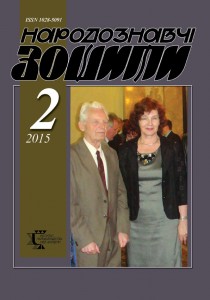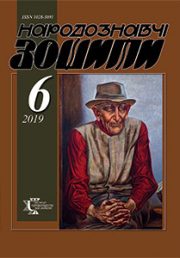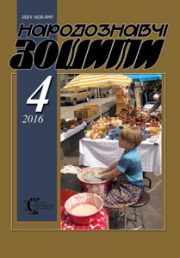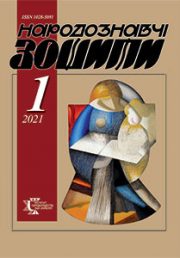
Kuzmenko Oksana. On folklore concept of prayer in people’s oral creations as for the great war: ukrainian experience. P. 283
The author has considered the folklore concept of PRAYER as element of Ukrainians’ oral linguistic world-outlook reflected by means of WWI-related lyrical and epic works. Oral texts of various genres (memoir stories, tales, and songs-chronicles) have been under consideration. The above mentioned concept gained various forms and ways of realization (motive, formula, implicit image).
Keywords: WWI, PRAYER notion as folklore concept, image, motive, plot, religiousness, mentality.
read »
Pyzhyanova Natalia. Porfyrii demutsky’s kyivan activities in 1917 to 1927. He ethnographer’s artistic legacy and its meaning for the repertoire of the main ukrainian choirs. P. 290
The article has been dedicated to Porfyrii Demutsky’s ethnographical activities. In the course of study a point has been suggested, that Porfyrii Demutsky’s creative work in the greater measure influenced the popularity of folk songs and their use in the repertoire of main Ukraine’s choirs. Especial attention has been paid to the meaning of Porfyrii Demutsky’s collaboration with artistic singers as well as professional and amateur choirs in 1917—1927. The influence of Porfyrii Demutsky’s ethnographic heritage upon the manner of certain choirs’ performance has beem defined and proved. Accessible materials, that testity Porfyrii Demutsky’s geographic spaces of creative interests have been investigated.
Keywords: Porfyrii Demutsky, ethnographical materials, creative collaboration.
read »
Holyk Roman. Between entertainments, sciences and ideologies: regional travels and local studies in soviet and post-soviet halychyna. P. 296
The author has considered some ways and means used for functioning the local historical studies and tourist projects along the Western Ukraine in Soviet and post-Soviet era. Analyses have been made as for the Soviet ideological stereotypes and their influence on the ethnological search and different kinds of tourism in the region. At the same time have been presented certain changes in the sphere through the first decades of Ukrainian independence. The role and the function of books and book-reading in these processes have been underlined.
Keywords: Galicia / Western Ukraine, the Soviet period, post-Soviet history, ethnology, tourism, travel guides, reading, ideology, myth.
read »
Hlushko Mykhailo. On ukrainian linguists’ ethnographic subjects in the columns of dialectological studies proceedings. P. 306
This reviewing article has been dedicated to the contemporary Ukrainian linguists’ ethnographical themes in the co¬lumns of Dialectological Studies Proceedings. Most often they have studied the people’s vocabulary, esp. its contents as well as origin, semantics and spreading in such areas of Ukrainians’ traditional culture and homestead works as main and auxiliary occupations (cattle-breeding, hunting, fishing, bee-keeping, artistic arts and crafts), material (home, dress, eating) and spiritual (family and calendar ritualism, certain kinds of folklore knowledge in medicine and veterinary) culture. Especial attention has been paid to regional characteristics, i.e. to mapping of linguistic phenomena, their spatial spread and temporal stages of evolving with discovering of present and hidden cultural realities. Linguistic phenomena have represented speech peculiarities in population of San Basin, lands of Boikos, Hutzuls, Cental Podilia, Eastern Sloboda territories, part of Lemko region, low-lands of Transcarpathia, Opilya, Northern Bukovina, Volhynia, Middle Dnieper and other ethnographic climes of Ukraine.
Keywords: Ethnology, Dialectological Studies Proceedings, ethnographic subjects, dialects of the Ukrainian language, vocabulary of common culture, semantics of word, history of word, folklore.
read »
Dyakiv Volodymyr. On versatility of humanitarian scholar Roman Kyrchiv (A Word on Teacher). P. 321
read »
Kyrchiv Roman. Ivan biretkyi, the folklore scholar. P. 327
In this article written on the basis of archival and printed sources has been studied a less-known figure of Ivan Biretsky (1815—1883), participant and co-laborer of Markiyan Shashkevych’ Circle that in 1830s and 1840s initiated the movement of national and cultural revival in the Western Ukrainian lands. Especial attention has been paid to folkloristic studies of Ivan Biretsky’s who was first collector and scholar of Lemko traditional oral sung poetry, attending in the greater measure upon fixation of quite valuable texts as people’s carols, spring chants etc. His records had been known among the ethnograpers and got high notes of I. Sreznevsky, M. Kostomarov as well as enlarged folklore works by Y. Holovatsky. I. Biretsky had kept researchable relations with I. Vahylevych, with Czech scholars K. Zap, F. Yakhim and took active part in revolutionary events of 1848.
Keywords: folklore studies, ritual songs, Christmas carols, roundabout way folklore, creative relations, influence, inter-Slav relations.
read »
Kyrchiv Roman. Оn system conceptualization of Ivan Franko’s entire folkloristic work. P. 340
read »
Nykorak Olena. Her life’s credo. P. 344
read »
Vynohradska Halyna. In creative collaboration. P. 349
read »
Sapelak Oksana. «If you could knew how weighty word might be…». P. 353
read »
Hodovanska Oksana. Father Bosco’s by-centennial jubilee. P. 361
read »
Pastukh Nadiya. On some markers of the borderland specificity in folklore: thematic priorities of ukrainian oral narratives in northern moldova. P. 364
The article has presented an analytic research-work in foremost themes of Ukrainian folklore on the North of Moldova; the rise of those has been actualized under conditions of inter-ethnical contacts by means of important binary opposition of «own/alien space». Characteristics have been given of related thematic units, as e.g. narrator’s leaving of native country and search for survival abroad or the settlers’ hard luck in foreign land and their sorrow for the native one.
Keywords: theme, border folklore, legend.
read »
Kharchyshyn Olha. Some facts as for history of studies in moldavian ukrainians’ folklore (1870—1930). P. 370
The article has thrown some light upon the history of studies in folklore of Moldavian Ukrainians; evaluations of earlier research experience from the points of view by the present-day scholars have been exposed. Attention has been paid to the period of 1870s—1930s from the first notation of this folklore up to the pre-Soviet times.
Keywords: folklore, Ukrainian of Moldova, Bessarabia, records, research.
read »
Movna Ulana. On ambivalence of ukrainian bee-keeper’s figure: between the divine and the unpure. P. 376
In the study have been considered Ukrainian society’s some traditional approaches to the figure of bee-keeper with the latter’s evident ambivalent character. The figure of bee-keeper had conceived as a moral authority of rural community as well as sui generis mediator between humans and supernatural po¬wers, representative of Divine and Evil principles, bearer of sacral knowledge, closed for not consecrated adepts.
Keywords: bee-keeper, ambivalence, sacral, Ukrainian.
read »
Pukivsky Yurii. Give birth, o lord, to everyone’s fate: on spring agrarian customs and ritualism in ukrainians of historio-ethnographic volhynia. P. 388
The article has brought some light upon the labour ritualism in Ukrainians of historio-ethnographic Volhynia. Those ritual acts have been closely tied with field works in the springtime. Va¬rious customs and rites have been inseparable part of ploug¬hing, sowing and seeding aimed securing rich future harvest completing the wholeness of Volhynian agrarian calendar.
Keywords: sowing, ploughing, rites, rituals, beliefs, prohibition, historical-ethnographic Volhynia.
read »
Bilyakovskyy Petro. People’s notions as for the influence of meteorological phenomena on family and public life (after materials from the Ukrainian Carpathians). P. 396
In the article have been described some spread among Carpathian Ukrainians manifestations of weather as the exordia of future events. Certain main groups of beliefs, coincided with rites of family cycles and especial dates of agricultural calendar, have been determined. Particular beliefs, connected with appearance of comets, were investigated.
Key words: weather, weddings, funerals, comet.
read »
Kotsan Vasyl. On traditional wedding-dress of transcarpathia through XIX to first half XX cc. P. 402
The article has been dedicated to research-work in some features of traditional Transcarpathian wedding-dress through XIX to first half XX cc. On the basis of field, archival and literary sources, museum collections etc. all general components in the dresses of bride-couples especially as for cuts and shapes have been analysed in conformity to local forms of traditional folk wedding customs. Next to description of cutting out and finishing elements large enough attention has been paid to the ceremonial role of separate elements of weddings line-ups. Quite Important point consisted in exposure of especial and highly-differentiated details in production and decoration of the same wedding attribute along the various regions of the land. With its firm all-Ukrainian basis traditional Transcarpathian folk wedding had and still has had a lot of local variants.
Keywords: wedding dress, shirt, blouse, skirt, apron, belt, fur sleeveless jacket, hair-dos and head-dresses, chaplet, decorations, from a bead, trousers, hat, knee-boots, weddings axes.
read »
Nyemyets Viktor. Structural elements of a slumber party in the traditional wedding of volyn and Polissya (second half of the XIX — first half of the XX ct.). P. 414
The paper based on field ethnographic data and literary sources presents an analysis of integral components of a slumber party in the traditional wedding of Volyn and Polissya. The author investigates this wedding stage in a context of its ritual filling, attributes, acts and their executants.
Keywords: slumber party, tree, wreath, candle, braid.
read »
Radovych Roman. On evolving of polisian window. P. 419
The article has presented some processes as for the origin and for ming of lighting apertures in Polisian dwellings. Analytical studies in constructive varieties and peculiarities of their arrangement have been performed. An attempt has been made in discovering of temporal parameters for penetration of separate constructive variants of windows as well as perimeter binding of windows, boxes, glasses etc.
Keywords: Polisia, dwelling, window, window frame, shutter.
read »
Shcherban’ Anatolii’, Shcherban’ Olena. On forms and destinations of ukrainian clay tableware in the second half XIX and the first third XX cc. P. 435
In the article have been analyzed main groups of Ukrainian clay tableware used through the second half XIX and the first third XX cc. Especial attention has been paid to certain peculiarities of their form-creating and decorativeness. Conclusion has been suggested that the features of every group contents correlated with their functional destination.
Keywords: clay tableware, form, decor, pot, jug, jar, culture of eating, Ukrainians.
read »
Hoshchytska Tetyana. On monastery in kolodka tract near the village of dubyna in carpathians. P. 445
The task of research-work is localization of the late medieval monastery in Kolodka tract near the village of Dubyna, Skole region, Lviv obl. according to the existence of an iron cross mentioned by Kornylo Ustyjanovych. The author’s own ethnographic study based upon numerous historical and folklore sources, has confirmed the placement of monastery or church and the cemetery at this point. Archeological sources, written mentions by K. Ustyjanovych and I. Krypyakevych as well as narrative data have made us to give credit to existence of Holy Virgin’s monastery at this point. Further studies are to confirm or negate the observation.
Keywords: monastery, church, Kolodka tract, ethnographic studies, stone cross, location.
read »
Serebryakowa Olena. On ritual symbolism and functions of midsummer day wreaths in cherkasy region: aspect of mantic magic. P. 450
On the basis of field materials analytical studies have been performed as for traditional divinatory acts with Midsummer wreaths. Light has been thrown upon functions and of symbo¬lism in those vegetative attributes as well as on the present state of mantic practices in Cherkasy region.
Keywords: divinations (mantic actions), wreaths, water, candle, fire, marriage, girlhood, life, death.
read »
Vojtovych Nadiya. From the studies in folklore demonology: «bezpirni», the pretimely «evil» deceased (after field materials of boiko land). P. 457
In the article have been presented certain research conclusions as for some peculiarities of Boikos’ traditional demonological notions concerning the so called «evil» deceased; points and features distinguishing those from other representatives of Boikos’s demonological system have been analyzed.
Keywords: «bezpirni», «evil» deceased, people’s demonology, demonological notions, Boiky.
read »
Kryvenko Anastasiya. On the image of witch in the midsummer day’s beliefs in volhynians. P. 463
In the article have been analyzed certain demonological beliefs and ceremonial actions present in the Midsummer Day’s traditions in population of the historical and ethnographic Volhynia are analyzed. Traditions of Volhynians as to specific properties and functions of witches as well as methods of their magic neutralization have been considered and exposed.
Keywords: demonology, witch, Midsummer Day, beliefs, visions.
read »
Poshyvailo Mariya. A potter and a ghoul in ukrainian bylychka stories. P. 476
In the article has been exposed and analyzed folklore motif of a potter’s meeting with a ghoul, the subject spread owing to bylychka tales through XIX to XX cc. and fixed by prominent Ukrainian folklorists and ethnographers. The research-work has been dedicated to a potter’s mysterious image and mytho¬logizing of his activities as preconditions for rise of the plot as to interaction of a craftsman and demonic characters.
Keywords: potter, ghoul, Ukrainian folklore, bylychka tales, demonic creatures.
read »
Lunyo Yevhen. Kobzar vs. Dictator: taras shevchenko’s personality and motives in people’s sung satirizing of mykyta khruchev. P. 480
In the article written upon the bases of original textual small folklore genres by means of their detailed ideo-artistic analysis the point has been traced of T. Shevchenko’s personal way and measure as well as his poetical motives were used in people’s sung political satirizing of Kremlin dictator, the ruler of Soviet empire M. Khruchev.
Keywords: folklore political satire, T. Shevchenko, Testament by T. Shevchenko, small folklore genres, M. Khruchev, Moscow-Communist system, totalitarian regime.
read »
Martynova Anastasia. Viktor svjatishin (1877—1942), a songster of vyborgh land. P. 492
Out of oblivion has been turned the name and creative work by Vyborg painter Victor Svjatishin skillful draughtsman and gif¬ted panter, watercolourist, sketchist, photograper of his native town historic buildings as well as natural views of Karelian Isthmus. Artist’s figure has been quite good known in Finland; in Vyborg as for now it was perfectly forgotten.
Keywords: Viktor Svjatishin, Vyborg, artist, watercolor, indian ink, photography, Museum, art teacher, Karelian Isthmus, Atheneum, Lahti, Salmi.
read »
Babiy Svyatoslav. Lviv international eastern fair architectural complex, history and problems of conservative keeping. P. 501
The article has presented a history of exhibitive hall system developed over Lviv Stryjski park upper terrace in the framework of formational project for Eastern Fair architectural complex. Under strict analysis has been put current state of buildings in the complex and suggested first-rank measures for their further conservation, usage and development.
Keywords: Lviv, architectural complex, Eastern Fair International Exhibition, Stryjski park, interwar period.
read »
Stepan Pavluk, Yevhen Pashchenko. Ukrainian scholars in Croatiean. P. 516
read »







